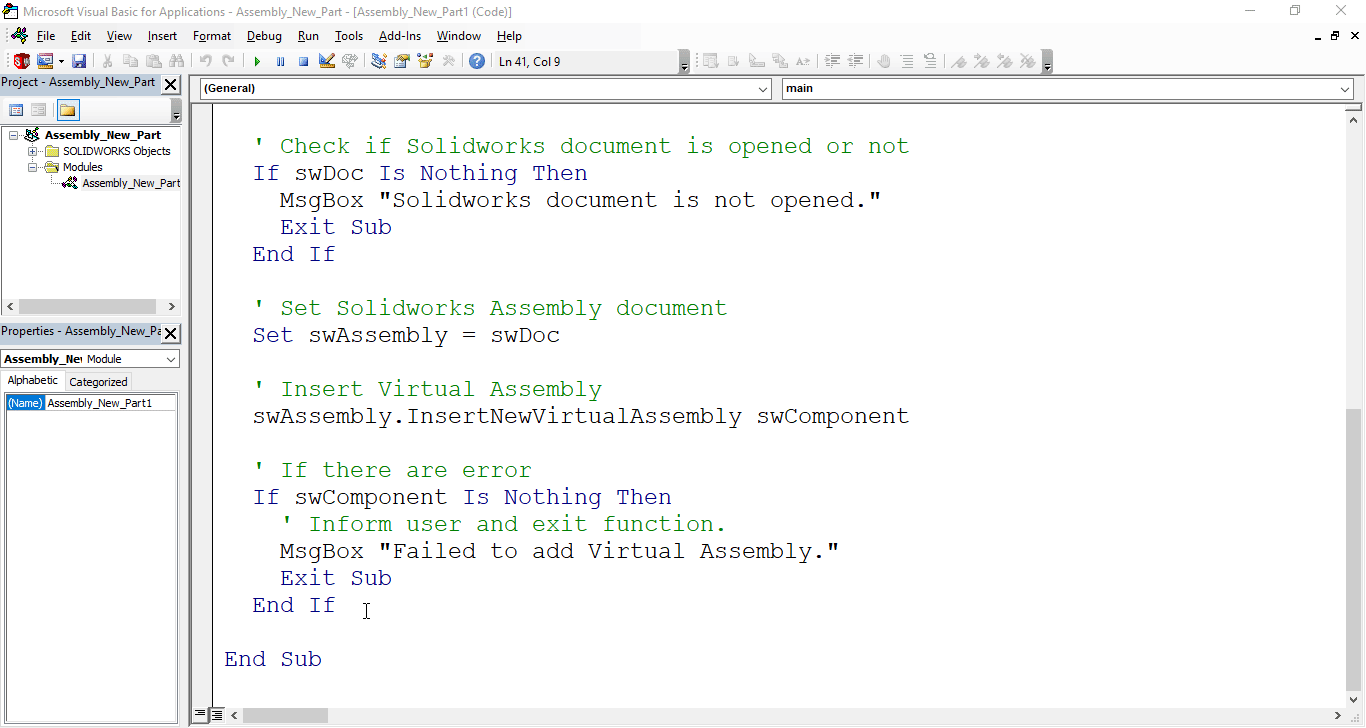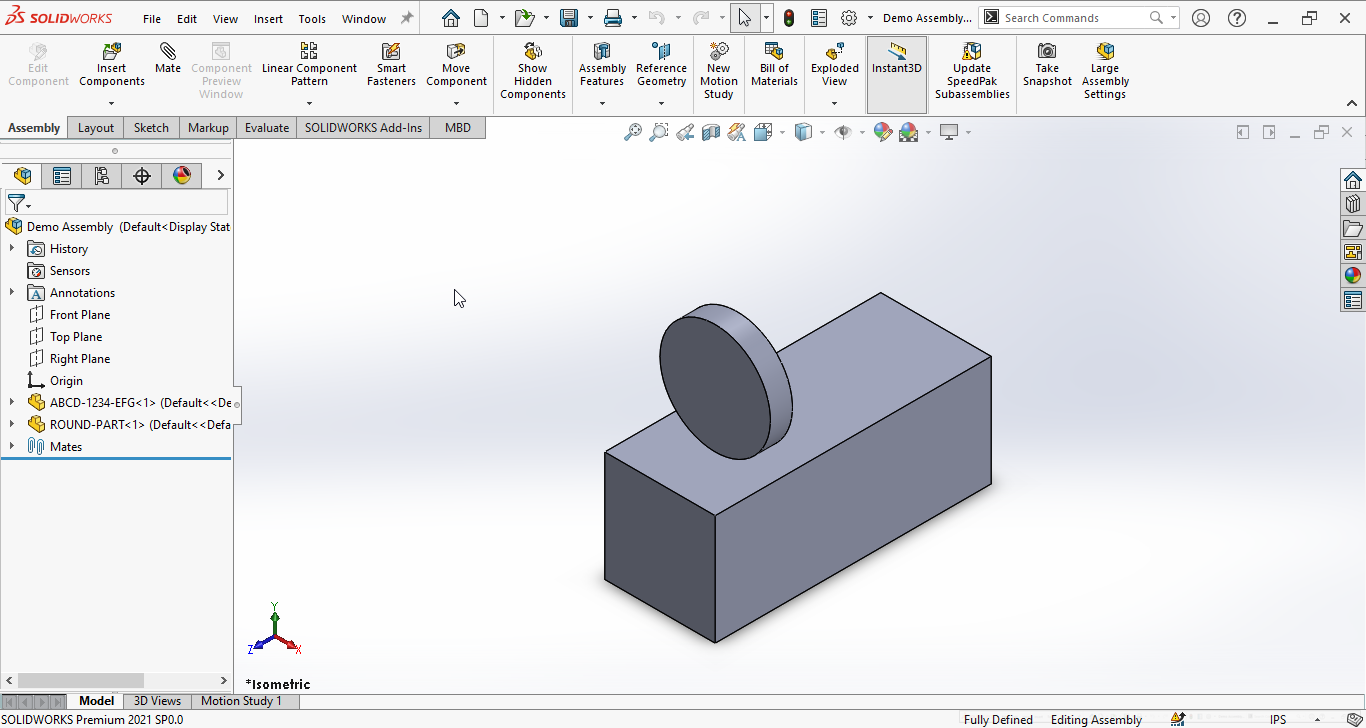Solidworks VBA Macro - Insert Virtual Assembly
Objective
In this article, we understand “how to” Insert Virtual Assembly in Assembly document from VBA macro.
This is most updated method of inserting Virtual Assembly in an assembly document.
Results We Can Get
Below image shows the result we get.
We Insert Virtual Assembly in simple manners.
There are no extra steps required.
To get the correct result, please follow the steps correctly.
Macro Video
Below 🎬 video shows how to Insert Virtual Assembly from SOLIDWORKS VBA Macros.
Above video is just for visualization and there is no explanation.
I have explained every line in this article.
It is advisable to watch video, since it helps you to better understand the process.
VBA Macro
Below is the VBA macro for Insert Virtual Assembly.
Option Explicit
' Variable for Solidworks Application
Dim swApp As SldWorks.SldWorks
' Variable for Solidworks document
Dim swDoc As SldWorks.ModelDoc2
' Variable for Solidworks Assembly
Dim swAssembly As SldWorks.AssemblyDoc
' Variable for Solidworks Component
Dim swComponent As SldWorks.Component2
' Program to Insert virtual Assembly
Sub main()
' Set Solidworks Application variable to current application
Set swApp = Application.SldWorks
' Set Solidworks document variable to currently opened document
Set swDoc = swApp.ActiveDoc
' Check if Solidworks document is opened or not
If swDoc Is Nothing Then
MsgBox "Solidworks document is not opened."
Exit Sub
End If
' Set Solidworks Assembly document
Set swAssembly = swDoc
' Insert Virtual Assembly
swAssembly.InsertNewVirtualAssembly swComponent
' If there are error
If swComponent Is Nothing Then
' Inform user and exit function.
MsgBox "Failed to add Virtual Assembly."
Exit Sub
End If
End Sub
Prerequisite
There are some prerequisites for this article.
- Knowledge of VBA programming language is ❗required.
- We use existing parts in Assembly document.
- Both components are fully constraint as shown in below image.
We will apply checks in this article, so the code we write, should be error free mostly.
Steps To Follow
This VBA macro can be divided into following sections:
- Create Global Variables
- Initialize Global Variables
- Insert Virtual Assembly
Every section with each line is explained below.
I also give some links (see icon 🚀) so that you can go through them if there are anything I explained in previous articles.
Create Global Variables
In this section, we create global variables.
Option Explicit
- Purpose: Above line forces us to define every variable we are going to use.
- Reference: 🚀 SOLIDWORKS Macros - Open new Part document article.
' Variable for Solidworks application
Dim swApp As SldWorks.SldWorks
- Purpose: In above line, we create a variable for Solidworks application.
- Variable Name:
swApp - Type:
SldWorks.SldWorks - Reference: Please visit 🚀 online SOLIDWORKS API Help.
' Variable for Solidworks document
Dim swDoc As SldWorks.ModelDoc2
- Purpose: In above line, we create a variable for Solidworks document.
- Variable Name:
swDoc - Type:
SldWorks.ModelDoc2 - Reference: Please visit 🚀 online SOLIDWORKS API Help.
' Variable for Solidworks Assembly
Dim swAssembly As SldWorks.AssemblyDoc
- Purpose: In above line, we create a variable for Solidworks Assembly.
- Variable Name:
swAssembly - Type:
SldWorks.AssemblyDoc - Reference: Please visit 🚀 online SOLIDWORKS API Help.
' Variable for Solidworks Component
Dim swComponent As SldWorks.Component2
- Purpose: In above line, we create a variable for Solidworks Component.
- Variable Name:
swComponent - Type:
SldWorks.Component2. - Reference: Please visit 🚀 online SOLIDWORKS API Help.
These all are our global variables.
They are SOLIDWORKS API Objects.
' Program to Insert virtual Assembly
Sub main()
End Sub
- In above line, we create main Program to Insert virtual Assembly.
- This is a
Subprocedure which has name ofmain. - This procedure hold all the statements (instructions) we give to computer.
- Reference: Detailed information 🚀 VBA Sub and Function Procedures article of this website.
Initialize Global Variables
In this section, we initialize global variables.
' Set Solidworks Application variable to current application
Set swApp = Application.SldWorks
- In above line, we set value of
swAppvariable. - This value is currently opened Solidworks application.
' Set Solidworks document variable to currently opened document
Set swDoc = swApp.ActiveDoc
- In above line, we set value of
swDocvariable. - This value is currently opened part document.
' Check if Solidworks document is opened or not
If swDoc Is Nothing Then
MsgBox ("Solidworks document is not opened.")
Exit Sub
End If
- In above code block, we check if we successfully set the value of
swDocvariable. - We use 🚀 IF statement for checking.
- Condition:
swDoc Is Nothing - When this condition is
True,- We show and 🚀 message window to user.
- Message: SOLIDWORKS document is not opened.
- Then we stop our macro here.
' Set Solidworks Assembly document
Set swAssembly = swDoc
- In above line, we set value of
swAssemblyvariable. - This value is
swDocvariable.
Insert Virtual Assembly
In this section, we Insert Virtual Assembly.
' Insert Virtual Assembly
swAssembly.InsertNewVirtualAssembly swComponent
- In above code, we Insert Virtual Assembly into assemly.
- For this, we use
InsertNewVirtualAssemblymethod. - This
InsertNewVirtualAssemblymethod is part ofswAssemblyvariable. - This method takes 1 parameter.
- InsertedComponent: New assembly inserted as virtual component.
-
Return Value : This
InsertNewVirtualAssemblymethod return 👉 Error as defined by swInsertNewPartErrorCode_e. -
In our code, I have used following values:
Parameter Name Value Used InsertedComponent swComponent - Reference: For more details please visit 🚀 online SOLIDWORKS API Help.
' If there are error
If swComponent Is Nothing Then
' Inform user and exit function.
MsgBox "Failed to add Virtual Assembly."
Exit Sub
End If
- In above code block, we check if we successfully added Virtual Assembly or not.
- We use 🚀 IF statement for checking.
- Condition:
swComponent Is Nothing - When this condition is
True,- We show and 🚀 message window to user.
- Message: *Failed to add Virtual Assembly.
- Then we stop our macro here.
Now we run the macro and after running macro we get a New Virtual Assembly as shown in below image.
This is it !!!
I hope my efforts will helpful to someone! 😊
If you found anything to add or update, please let me know on my e-mail 📧.
Hope this post helps you to Insert Virtual Assembly with SOLIDWORKS VBA Macros.
For more such tutorials on SOLIDWORKS VBA Macro, do come to this website after sometime.
If you like the post then please share it with your friends also. 🙏🏻
Do let me know by you like this post or not!
Till then, Happy learning!!!

